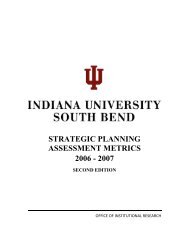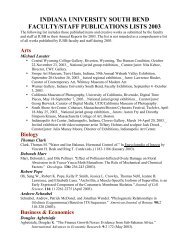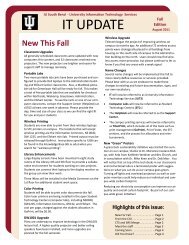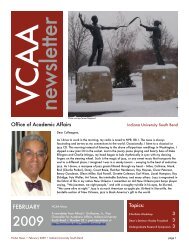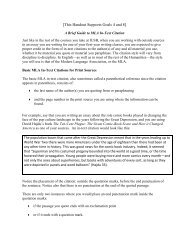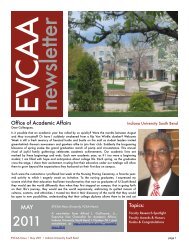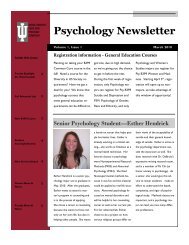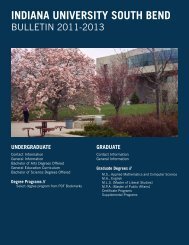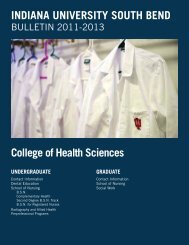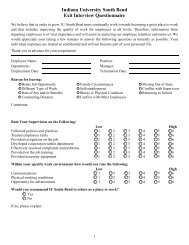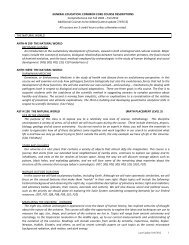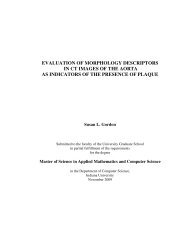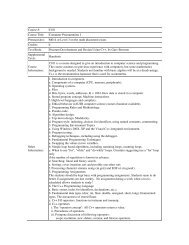Current version - Indiana University South Bend
Current version - Indiana University South Bend
Current version - Indiana University South Bend
Create successful ePaper yourself
Turn your PDF publications into a flip-book with our unique Google optimized e-Paper software.
1023 SCHOOL OF EDUCATION<br />
Because grades reflect the candidate’s academic<br />
performance, this letter is not used to report academic<br />
problems. Rather, it is used when there is a strong concern<br />
about a candidate’s ability to become a professional<br />
educator. For example, a candidate may exhibit a genuine<br />
dislike for children, frequently miss class or be tardy, or<br />
have behaviors that would seem inconsistent with the<br />
requirements of the education profession.<br />
The intent of this system is to add professional judgment<br />
to the teacher education process. When a Letter of<br />
Concern is filed, the candidate, the dean, and the advising<br />
office receive copies. Confirmation of this notification<br />
is sent to the person who filed the Letter of Concern.<br />
Except in very serious situations, two Letters of Concern<br />
must be received before a candidate’s case is reviewed<br />
by the dean, an advisor, and a faculty member. It is<br />
assumed corrective action will be taken and candidate<br />
performance will be monitored. However, such a review<br />
can result in termination of the candidate’s involvement<br />
in the program.<br />
Plagiarism<br />
Plagiarism is a serious infraction. All procedures in the<br />
Code of Student Rights, Responsibilities, and Conduct<br />
are followed in all cases of plagiarism.<br />
Plagiarism and academic misconduct include, but are<br />
not limited to, the following:<br />
1. Copying any other person’s work and submitting it as<br />
one’s own, whether as a written document or an oral<br />
presentation.<br />
2. Copying or paraphrasing passages, sentences,<br />
phrases, data, statistics, isolated formulas, and visual<br />
aids from print, oral, or Internet sources without<br />
proper acknowledgment.<br />
3. Using someone else’s ideas without giving credit to<br />
the source.<br />
4. Submitting a professionally prepared research paper<br />
as one’s own work.<br />
5. Submitting work that resulted from an unauthorized<br />
collaborative effort as individual work.<br />
6. Reusing or recycling a paper or research done for<br />
credit in a previous course without the permission<br />
and approval of all the professors involved.<br />
7. Offering material assembled or collected by others as<br />
one’s own project or collection.<br />
8. Fabricating or creating material (statistics, text, etc.)<br />
to cite as a legitimate source.<br />
9. Documenting a source inaccurately.<br />
Visit www.iusb.edu/~sbwrite/plagiarism.shtml for<br />
further information.<br />
Transfer Credit<br />
Candidates transferring from other degree programs and/<br />
or schools must meet with an advisor who determines<br />
whether prior courses meet the requirements of their<br />
desired degree program. Candidates who transfer may<br />
not be able to complete the degree program in the usual<br />
number of hours and semesters.<br />
If candidates wish to complete courses at other<br />
institutions, they should obtain approval for these<br />
transfers prior to registering for the course. Advisors in<br />
the Office of Education Student Services can assist with<br />
this process.<br />
Pass/Fail Option<br />
The university regulations for this option apply in the<br />
School of Education. A candidate may elect to receive<br />
a Pass/Fail rating in classes to fulfill general-education<br />
requirements, providing they are not in the major<br />
teaching areas or part of the requirements in professional<br />
education. The request for a Pass/Fail option must be<br />
completed during the first three weeks of fall and spring<br />
semesters, and during the first two weeks of a summer<br />
session by processing the prescribed request in the<br />
Office of Education Student Services. This election is not<br />
reversible. The limitation on Pass/Fail options described<br />
on page 32 of this publication applies.<br />
Note: Students should realize that an F in a credit-bearing<br />
course will be calculated in the GPA. Also, Pass/Fail<br />
courses do not count toward the required credit hours<br />
for the Dean’s List. If a passing grade is earned through<br />
this option, a grade of P is posted to the transcript.<br />
Probation, Dismissal, and<br />
Reinstatement: Before Admission to<br />
Teacher Education Program<br />
Candidates may be placed on probation or be dismissed<br />
at any point in the program when the academic criteria<br />
for education candidates and for continuing in the<br />
Teacher Education Program as outlined in the following<br />
sections are not met. Candidates may also be dismissed if<br />
the required artifacts are not submitted or if they provide<br />
evidence that candidates are not meeting standards nor<br />
making progress toward meeting standards.<br />
Probation and Dismissal<br />
Satisfactory Academic Progress<br />
A student whose cumulative grade point average (CGPA)<br />
is 2.0 or higher is considered to be making satisfactory<br />
academic progress at IU <strong>South</strong> <strong>Bend</strong>.<br />
Probation<br />
A student who has completed one or more IU <strong>South</strong><br />
<strong>Bend</strong> GPA hours and has a CGPA below 2.0 is placed on<br />
probation. A probationary student remains on probation<br />
until the CGPA reaches 2.0 or higher.



